For the rest of my life, whenever I hear the word “beef,” I won’t be fantasizing about juicy hamburgers, mouth watering steaks or the perfect plate of carpaccio. Beef will now forever remind me of “that wild spring and summer I spent in Seoul.” In the last several weeks Beef has become less gastronomical and more political than anyone could have ever expected. While the news here is centered around Beef, at the water cooler people are passionately chattering about riots, patriotism, politics and the madness of cows.
I have talked to many people in Europe and North America who had little to no clue that a bovine based political uprising was taking place just across the Pacific. A reader’s digest refresher:
My students all loath President Lee Myung-bak. The public has now dubbed him Two Mega-Byte (2MB for Myuny-bak) saying “he is so stupid you can fit his entire brain into two megabytes of memory.” Leave it to tech savvy Koreans to make an information technology joke seem hilariously appropriate when attacking their President. This may seem hard to believe, but the general population here has less trust in their President because of a beef deal than Americans do of Bush over his ridiculous war in Iraq.
The protests began in early May by people concerned about possible mad cow disease in U.S. beef but later grew into a forum where a wide variety of people gathered to air grievances against, President Lee who won a December election by a landslide. Lee has seen his support plummet and analysts say he cannot implement reforms such as privatizing state-run firms and revamping pension systems unless he wins back the public. Rallies last weekend left hundreds of protestors and conscripted riot policemen wounded, prompting religious leaders to join the rallies in the hope of calming things down.
South Korean and U.S. trade envoys reworked the beef deal in June with a private sector agreement that limits trade in beef to cattle under 30 months of age, thought to pose a low risk for mad cow disease, and prohibits shipments of risky body parts. U.S. and South Korean leaders have said there is no scientific evidence that shows the U.S. beef headed to South Korea poses a risk for the brain-wasting disease. American beef returned this week to store shelves in South Korea, once the third-largest overseas market for the product with annual sales of $850 million before Seoul banned sales in 2003 due to an outbreak of mad cow disease in the United States.
Major retailers have refused to sell the product out of fear of antagonizing Koreans, but a few independent butchers who offered U.S. beef quickly sold out. People lined up to buy the product that sells for at least half the price of Korean beef. I still find it very odd that the imported stuff is cheaper than what is home grown.
Overnight last Saturday, as US Secretary of State Condoleezza Rice was visiting Seoul, police fired water cannons, fire extinguishers, tear gas and used batons against protesters who hurled missiles and rocks at police. On Monday it was announced that 100,000 people protested in Seoul over the weekend. Due to the prolonged overnight clashes 114 police officers were injured and over 100 citizens were hurt.
Watching the news on Monday morning I stared in shock as a massive ocean of screaming people were surrounded by over 10,000 riot police. Several police buses were stationed in front of City Hall to form a blockade. Protestors attempted to topple one of the police buses and used metal pipes to smash in its windows.
US exporters have now agreed not to send meat from cattle older than 30 months. But opponents say safeguards are still inadequate with a newspaper survey showing more than six out of ten South Koreans are still concerned about health risks. A recent study also indicates that the U.S. beef deal has cost Asia’s fourth-largest economy about $2.5 billion.
If Korea’s Beef with Americas Beef wasn’t enough…the streets of Seoul are now home to a new group of angry citizens. Every spring and summer North Korea experiences serious famine putting millions of lives at stake. I have spent several hours reading through what seems like hundreds of articles on this dubious communist dictatorship. The more I read about Kim Jong Il’s “legacy” the more I felt like the world was turning a blind eye. A few North Korean’s have been able to successfully defect across the border to China or across the DMZ and their stories are gruesome.
The DPRK resumed public executions in October 2007. Prominent executed criminals include officials convicted of drug trafficking (a state monopoly) and embezzlement. A South Pyongan province factory chief convicted of making international phone calls from 13 phones he installed in his factory basement was executed by a firing squad in front of a crowd of 150,000 people in a stadium.
The North Korean government is said to routinely detain, torture and imprison thousands of individuals who are either dissidents or alleged saboteurs. Many refugees have come forward and recounted stories which describe conditions within the country. The government is accused of employing political prison camps, believed to hold as many as 200,000 inmates, including children whose only crime is having “class enemies” for relatives. There have been widespread reports from North Korean refugees of forced abortion, infanticide and famine in these camps. Extreme physical abuse is common (beatings often result in death). A North Korean guard who defected through the DMZ told reporters that when he worked at the prison camps he was told by his superiors that, “these people have no rights, they are animals.” An eerie parallel to the concentration camps of Dachau and Auschwitz.
In 2002, a former party official Lee Soon Ok gave testimony before a committee of the Unites States House of Representatives on her own treatment within North Korea’s criminal system. She reported extensive torture, including the loss of eight teeth and permanent facial paralysis. She also reported she was tried in a kangaroo court and sentenced to 13 years in a prison camp. A 2004 BBC documentary also reported that in one of these camps, North Korea tests chemical weapons on prisoners in a gas chamber.
Parallel’s between North Korea and the Holocaust are unavoidably clear. After reading myself to death on the issues I fell through a wave of emotions: shock followed by disbelief ending in anger. One would think that the horrors of World War II would have taught humanity a lesson. It angers me to know that just up the road millions of people are living in fear under a oppressive regime.
The cult of Kim Jong Il is far more disturbing than Hitler’s declaration of Aryan perfection. The millions of brainwashed in North Korea are oblivious to what is going on in the world. They have been told that their leader is divine and has supernatural powers. They follow his every world like fanatical groupies. They have no clue what an iPod is, let alone a cell phone. North Korea truly is stuck in a horrific war torn time warp. Barbaric, sadistic and disgusting. And we seem to be letting this happen. I am certain the world will look back at how it dealt (or chose not to deal) with the treatment of the innocents of North Korea and simply feel empty for its inhumane inaction. People don’t want to hear about the fact that the horrendous Holocaust conditions of World War II are very much alive.
The Beef rally’s in Seoul have recently been given a political twist as two groups stand face to face waving signs and shouting into the air. On one side, wealthy South Korean’s manically scream about Mad Cow America while opposite them a new group of South Koreans scream for their silent and starving long-lost relatives in North Korea. New civic groups now stand in the streets trying to remind the rest of the country (and the world) to wake up. As wealthy South Korean’s gripe about the potential minuscule possibility that American beef may be hazardous to their health, another group reminds them that millions of North Koreans just a few miles away are starving. It makes the whole Mad Cow Beef issue seem so insignificant and selfish.
And then Korea’s Beef issue impacted my own life like I never thought it would! It all started on a Tuesday afternoon around the water cooler. My fellow teachers were photocopying and chit chatting when our Head Instructor asked us if we would be interested in a free Korean Beef lunch on Friday. We were told the “All you can eat Seafood” restaurant (which is located in a free standing ship) down the street had been recently been bought out by new management. The new owners were switching stale oysters for the highest quality beef in this new “BBQ in a ship” experience. Apparently the restaurant had called the school and asked if any Caucasian Foreign teachers would be interested in a free Korean Beef BBQ lunch. All we would have to do is show up for their grand opening on Friday, eat lots of expensive beef and pose for a few pictures. We all assumed this was routine as many Korean restaurants display pictures of their patrons. Foreign patrons eating at a restaurant gives it a sort of exotic flare. An innocent assumption…how wrong we were!
We met in front of our work building and were greeted by a Korean businessman who was chattering on his cell phone. He looked a bit nervous as only four of the teachers at our school had managed to show up. As we walked towards the massive Restaurant Ship we all laughed as an arc of colourful balloons sat in the blue sky as two Korean models danced and sang on microphones as they welcomed patrons into the restaurant.
We walked up the stairs and were soon staring out across the dining room. My jaw dropped and we all sighed as we realized this Free Grand Opening Beef lunch was going to be far more intense than we had expected. We passed by five cameramen who were setting their massive video cameras on tripods. Approximately twenty photographers sat down chatting and stared up at us as we were being seated. The four of us sat down at a table fully prepared with hundreds of side dishes, wine glasses and tableware. Our table was dressed to feed eight people. We sat like wet dogs at the far end as we waited for some direction.
A moment later a waitress brought over three huge platters of raw Korean beef and placed them over the BBQ which sunk into the center of our table. We all felt incredibly awkward as the entire room was staring at us. We all smiled and tried to look merry even though the situation was very confusing. The PR guy who had walked us to the restaurant came up to us and asked, “when are your other friends arriving?” We told him, “oh it’s just us.” He looked like he had just seen a ghost. He slowly walked away and talked to the owner of the restaurant who had just been interviewed by Korean Broadcasting Station. They chatted for a few seconds and the owner looked like his head may explode. The PR guy scurried over to us again and asked if we could “phone any friends for a free beef lunch.” It was here that we felt even more awkward as we all flipped open our cell phones and desperately tried to get a few more white people to dine with us on very short notice.
Photographers began to circle around our table and took pictures of us as we nervously chatted on the phone with potential dining companions. After thirty minutes of whispered conversation along the lines of, “I feel horrible,” and “this is the worst free meal in the history of life,” the PR guy ran up to us one more time. We sadly had to inform him that we were going to be the only ones eating. He bowed his head and scurried off to talk to the seated News Room.
Our waitress returned to the table and started to snip pieces of thinly sliced Korean steak gently placing them on our sizzling grill. I stared down at a huge platter of raw beef and my eyes grew large. Korean beef is incredibly expensive, grass fed and comparable in price to Japan’s notorious Kobe beef. The plate featured slices of bright red meat with hundreds of thick white lines of fat throughout. A massive amount of marbling.
A few moments later we were told the beef was ready to eat. We all picked up our chopsticks and snatched up a piece of beef in one hand and wrapped it inside a lettuce leaf topped with a shred of kimchi. My teeth crunched down on the rare steak and I was speechless. The meat gushed juices which slipped through the cracks in my teeth and dribbled across my gums and down my chin. I quickly grabbed another slice of meat and this time decided to be a purist and simply placed the hot slice on my tongue. I closed my eyes and slowly closed my teeth down on the salty slice. Once again the meat burst in my mouth, a sensation that was surreal and very new to me. I stared up across the table and realized that I wasn’t the only one that was speechless. We all smiled and started chatting about how this was the best beef we were probably ever going to taste.
As we were eating I stared across the room to see the media folks chatting in a semi circle. All of a sudden they turned towards our table and marched over. I put my chopsticks down and muttered under my breath, “here we go.” For the next hour we were force fed hundreds of dollars worth of Korean beef until our insides rolled around and nearly burst at the seams. I tried to count the number of photographers who surrounded us but it was impossible as they were constantly moving. The owner of the restaurant poured us glasses of wine and we all did an embarrassing clash of our glasses, a faux cheers for the camera. I had a great time with the photographers as I really do light up on camera. My three other dinning companions were visibly embarrassed and awkward so I decided to ham it up a bit to lighten up the mood. I grabbed a pair of tongs and hung a huge piece of raw beef in front of my face as I smiled and thrust a peace sign into the air. The photographers then started to organize how we were eating for the perfect shot. The one female in the group was asked to feed one of my male coworkers a slice of meat. Incredibly embarrassing (as it ended up on the front page of the next days newspaper).
I started to have a lot of fun with the photographers as they excitedly shot pictures of us eating our never ending meal. They jabbed their meter long lenses across the table and I sometimes felt as though they may be taking a picture up our noses. My favorite part of the restaurant paparazzi scene was the shooting click of shutter speed and the strobe light of flashes. I started to play a game with the photographers. I’d pick up a piece of meat and slowly bring it to my face. I’d then tell everyone at the table to look at “my trick.” And as I slowly placed the meat in my mouth the room filled with the clatter and flashes of camera fire. Call me vain but I really did enjoy paparazzi at my dinner table.
Half way through the meal the photographers took a short break and four different news correspondents from the countries various news networks crouched down beside us for our nightly news interviews. A young male reporter who was immaculately dressed and clean cut sat across the table and nervously asked two of my male co-workers, “what do you think of this Korean beef? What do you like better, Korean beef or American beef?”
It was at this very moment that we all realized we weren’t here for a restaurant opening. We had been chosen to appear on national television simply because we were white foreigners eating Korean beef. The whole shoot and match had been carefully organized so the media could spin a story that “American foreigners think Korean beef tastes better than American beef.” They clearly wanted us to say that. We didn’t want to be rude (as the food was free) but we also realized we had been duped and misled and lied to about the reason for our invitation. We courteously responded, “the meat is tender and delicious, but we are Canadian and American and we have eaten American beef for years and it tastes delicious also.”
The newscasters were clearly upset that they hadn’t been able to get one of us to stupidly declare that Korean beef was the best thing we had ever tasted. They wanted a bunch of white people to appear on the National news to reassure Koreans that their beef was superior to the new American alternative. After our interviews the rest of the meal was even more awkward (if that is even possible). We all whispered at how angry we were that we were put in such a position. As we woddled out of the restaurant I couldn’t help but think that I may never need to eat another slice of beef again. That thirst had perhaps been quenched indefinitely. Little did we know, it would only get worse.
The next day at work we were motioned over to the office computer where our manager showed us the newscast of our dining experience. I was predominantly featured devouring a huge lettuce wrapped slice of meat as the juices ran down my chin onto my shirt. Oddly enough this wasn’t the most embarrassing moment of my life. The manager gave us a website which he told us to check out.
I sat at my computer on the Korean Times homepage where a picture of my coworker Karen devouring a piece of beef was prominently featured. Bellow the picture, the caption:
Try Korean beef: Foreign customers eat Korean beef at a promotional event at a restaurant chain in southeastern Seoul, Thursday. The “Dahanwoo (All Korean beef)” chain in Gwangjang-dong invited members of the association of foreign lecturers to try beef from cows raised in Gangwon Province.
As my students burst through the door I had to laugh out loud as the newspaper had fabricated “the association of foreign lecturers.” We have never even heard of this association but it sounds so official I decided to relish in my new found ties with the fictitious group.
Bellow the caption readers of the newspaper commented on the picture and the issues relating to our free lunch at the restaurant. My jaw dropped as I read the scathing commentary:
kimman
Hey, if somebody wants to give me a big feed of free bbq bleed, I don’t care where it comes from. But I would be worried about Korean beef, since it does not meet OIE standards.
clemens
That’s right Globetrotter. Those Koreans sure do have it coming for refusing to accept your country’s meat and injuring your national pride. You must feel very hurt right about now. Aw, no one wanted to eat your lovely beef! ;-(
pastor
They are happy because the beef is free…and that is all that matters to them.. If I could get free beef I wouldn’t care if it was American or Korean beef…
Globetrotter
South Korea thinks they can Tap Dance out of this Issue—-sorry to say, your not. In fact, your La-La Land Dreaming is about to come to an end—-with some very harsh realities; starting with deal the South Korean Beef Industry a crippling blow–a blow so hard, even the North Korean is going to feel your…pain.
Globetrotter
I did not know there was an issue of Westerners eating Korean Beef—–what are we trying to say here? After two months of very hateful things said about the American Beef Product—-you actually think this sort of Circus Stunt is going to bring you any favors? Nahhh…certain Koreans played a Card they should have never, apologies have not been given to the U.S., their Beef Industry, nor the United States Public—yet.
clemens
Well, those foreigners sure do like Korean raw beef.
commieclemens
Let’s see what she looks like in five years when she has mad cow disease. Actually it looks like she already has mad cow disease.
Show looks like she already has mad cow disease.
stl81
I know that girl is probably not flattered with the picture they took of her… Hah! And could someone please show her how to use chopsticks…
Raven767
BTW, why did they use Canadians when the issue seems to be with American Beef? Second, I thought the problem was that KOREANS didn’t want to eat AMERICAN beef????? What is this stunt proving?
Amerkrean Hello you all from the land of black angus steaks! It’s vacation time, and do I ever appreciate US beef. I’ve been doing my best to catch mad cow disease, but alas, no luck yet. But I’ll keep on trying. Filet mignon tonight, rare. Anyway, to topic. Yes, hanwoo is good, but having said that, there’s no way it can compare to US beef. If these foreign teachers tasting Korean beef grew up on farms in the US, they’d tell you for sure that there’s no substitute for black angus beef.
I was squirming in my chair for the first hour of class and at break time I burst through the door. I could instantly tell that all of the other teachers had read the same commentary. I felt so badly for Karen as she had just been publicly humiliated.
And this is the story of how a few unsuspecting foreigners who simply wanted a free lunch ended up getting bit in the ass by a mad cow.
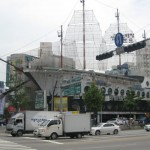

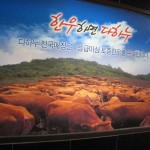


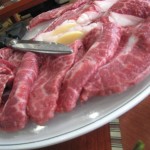
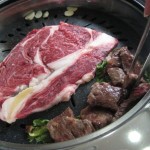





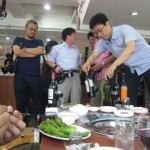
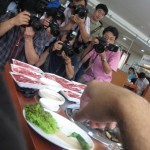
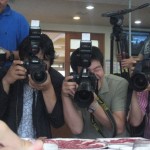
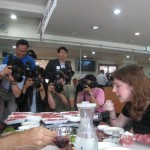


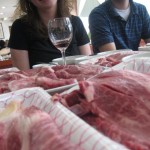


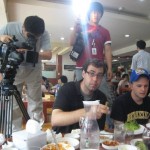





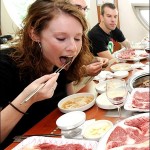
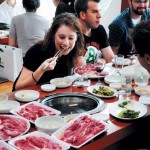
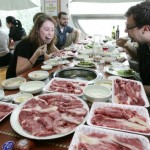


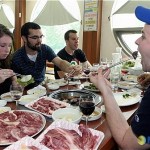



Carne-alapalooza
Vegan’s beware!